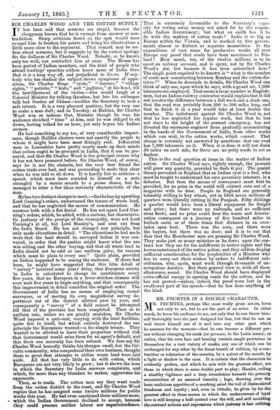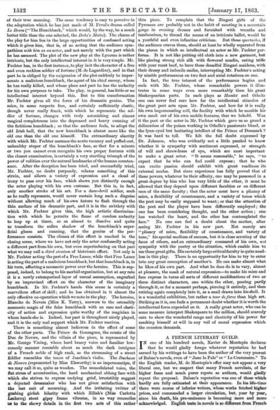MR. FECHTER IN A DOUBLE CHARACTER.
MR. FECHTER, perhaps like most really great actors, loves not only to act, but to act the part of an actor. In other words, he loves his audience to see, not only that he can throw him- self thoroughly into the part designed for him, but that he can as well throw himself out of it and into any other part which he assumes for the moment—that he can become a different per- son without changing his mask (or persona, in the Latin sense); or rather, that his own face and bearing contain ample provisions in themselves for a vast variety of masks, any one of which can be exchanged for any other by the finest breath of volition, by a con- traction or relaxation of the muscles, by a quiver of the mouth, by a light or shadow in the eyes. It is certain that the characters he evidently prefers, and which he acts with the greatest effect, are those in which there is some double part to play; Hamlet, veiling a stealthy vigilance and a deep irresolution beneath the princely eccentricities of an assumed insanity ; lags, drawing over the keen malicious appetites of a mocking mind the veil of dissimulated frankness and loyalty ; and, even in Othello, he gives by far the greatest effect to those scenes in which the undercurrent of loyal love is still keeping a half-control over the will, and still moulding the outward actions and expressions which jealousy is fast robbing of their true meaning. The same tendency is easy to perceive in the adaptation which he has just made of M. Fevers drama called .Le 13ossu ("The Hunchback," which would, by the way, be a much better title than the one selected, the Duke's Motto). The charm of the play for him lies in the large opportunities of confessed acting which it gives him, that is, of so acting that the audience sym- pathizes with him as an actor, and not merely with the part which he has assumed. The plot of the new play at the Lyceum is rather intricate, but the only intellectual interest in it is very simple. Mr. Fechter has, in the first instance, to play hilt the character of a free and even reckless soldier of fortune (M. de Lagardere), and in that part he is obliged by the exigencies of the plot suddenly to imper- sonate a malicious hunchback, the agent of his chief enemy, whom he has really killed, and whose place and part he has the audacity for his own purposes to take. • The play, in general, has little or no intellectual interest beyond this. But to this transformation Mr. Fechter gives all the force of his dramatic genius. The mien, in some respects free, and certainly sufficiently elastic, though never really frank, with which he represents the sol- dier of fortune, changes with truly astonishing and almost magical completeness into the depressed and heavy cunning of the fictitious hunchback ; so that the audience feels, to adopt the old Irish bull, that the new hunchback is almost more like the old one than the old one himself. The extraordinary alacrity with which Mr. Fechter assumes the acute vacancy and puffed-out, unhealthy stupor of the hunchback's face, so that for a minute or two you cannot even recognize his own proper features with the closest examination, is certainly a very startling triumph of the power of volition over the natural landmarks of the human counten- ance. After the deception has been tried, and successfully tried, Mr. Fechter, no doubt purposely, relaxes something of this strain, and allows a variety of expression and a cloud of irony to pass over his face, which shows you distinctly enough the actor playing with his own costume. But this is, in fact, only another stroke of his art. For a dare-devil soldier, such as he really represents, would never sustain long such a disguise without allowing much of his own nature to flash through the thin surface of his dramatic part, and it is in the subtlety with which Mr. Fechter gives this, the high artistic discrimina- tion with which he permits the flame of careless audacity to leap up at times, so as almost to dissolve and quite to transform the sullen shadow of the hunchback's super- ficial gloom and cunning, that the genius of the per- formance consists. The climax of this effort is reached in the closing scene, where we have not only the actor confessedly acting a different part from his own, but even superindncing on that part what we may call a third stratum of histrionic effort. Not only is Mr. Fechter acting the part of a Free Lance, while that Free Lance is acting the part of a malicious hunchback, but that hunchback is, in his turn, affecting a mesmeric power over the heroine. This is sup- posed, indeed, to belong to his morbid organization, but at any rate it is a newly extemporized layer of unreal assumption, engrafted by an improvised effort on the character of the imaginary hunchback. In Mr. Fechters hands this scene is certainly a marvellous effort of skill; and he has obtained in it almost the only effective co-operation which we note in the play. The heroine, Blanche de Nevers (Miss K. Terry), answers to the ostensibly mesmeric magic of the false hunchback with an ease and elasti- city of action and expression quite worthy of the magician in whose hands she is. Indeed, her part is throughout nicely played, and it is the only real support which Mr. Fechter receives.
There is something almost ludicrous in the effect of some of the other parts. The Prince de Gonzagues, the cousin of the Duo de Nevers, and the villain of the piece, is represented by Mr. George Vining, whose hard brassy voice and familiar low- comedy manner resemble about as much the dark intrigues of a French noble of high rank, as the strumming of a street fiddler resembles the tones of Joachim's violin. The Duchesse de Nevers (represented by Miss Elsworthy) is an impersonation, if we may call it so, quite as wooden. The =modulated voice, the flat stress of accentuation, the hard mechanical oblong face with which she strives to express undying grief, irresistibly suggest a dejected dressmaker who has not given satisfaction with the last suit of mourning. And the irritating twitter of gushing girlish hilarity with which Zillah's (Miss Carlotta Leclercq) stout gipsy frame vibrates, in no way reconciles us to the showy details in the first two acts of this rather
thin piece. To complain that the Zingari girls of the Pyrenees are probably not in the habit of meeting in a mountain gorge in evening dresses and furnished with wreaths and tambourines, to thread the mazes of an intricate ballet, would be a youthful and even infantine criticism. But these spectacles, if the audience craves them, should at least be wholly separated from the pieces in which so intellectual an actor as Mr. Fechter per- forms. It is not like putting old cloth into a new garment, but like piecing strong rich silk with flowered muslin, eating trifle with your roast beef, to have these dreadful Zingari maidens, with their dressy and imbecile smiles, interrupting Mr. Fechter s acting by nimble performances on two feet and axial rotations on one.
In fact, the true interest of the performance begins and ends with Mr. Fechter, whose remarkable powers it illus- trates in some ways even more remarkably than his great Shakespearian parts. In such plays as Hamlet and Othello one can never feel sure how far the intellectual stimulus of the great poet acts upon Mr. Fechter, and how far it is really his own impersonating will, the facility with which he moulds his own mask out of his own mobile features, that we behold. Was it the poet or the actor in Mr. Fechter which gave us so grand a delineation of the poison working in Othello's passionate blood, or the lynx-eyed but hesitating intellect of the Prince of Denmark ? It was hard to tell. We felt the full doubt expressed by Dr. Johnson, who was evidently not a little puzzled to know- whether it is sympathy with sentiment expressed, or strength of will and shrewdness of eye, which are most important to make a great actor. "It seems reasonable,' he says, " to expect that he who can feel could express ; that he who can excite passion should exhibit with great readiness its external modes, But since experience has fully proved that of these powers, whatever be their affinity, one may be possessed in a great degree by him who has very little of the other, it must be allowed that they depend upon different faculties or on different uses of the same faculty ; that the actor must have a pliancy of mien, a flexibility of countenance, and a variety of toms which the poet may be easily supposed to want ; or that the attention of the poet and the player have been differently employed ; the- one has been considering thought, and the other action ; one- has watched the heart, and the other has contemplated the face." No one can feel a doubt about the matter, after seeing Mr. Fechter in his new part. Not merely are "pliancy of mien, flexibility of countenance, and variety of tone," his special medium of success, but it is close scrutiny of the- faces of others, and an extraordinary command of his own, nit sympathy with the poetry or the situation, which enable him to use these great gifts. His certainly large critical faculty is quite need- less in this play. There is no opportunity for him to try to enter into any great conception of another's. He can make almost what he likes of his own part. And what he does do is to vary, almost at pleasure, the mask of natural expression—to make his mien and face express in turns all sorts of different modifications of two or three distinct characters, one within the other, peering partly through it, or for a moment perhaps, piercing it entirely, and then retiring again completely into it, as a snail draws into his shell. It is a wonderful exhibition, but rather a tour de force than high art. Striking as it is, one feels a permanent doubt whether it is worth the intellectual force expended on it. A really great actor, who can in. some measure interpret Shakespeare to the million, should scarcely care to show the wonderful range and elasticity of his power for- masking himself at will in any veil of moral expression which the occasion demands.































 Previous page
Previous page